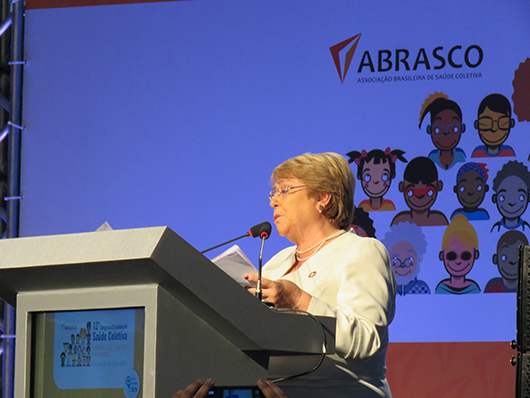At Fiocruz, Michelle Bachelet advocates Health as a right
14/08/2018
Renata Moehlecke (Agência Fiocruz de Notícias)

Foto: Rafael Venuto
"Today we are gathered to say that we want Health as a right. Health is a fundamental condition for the dignity of every human being, always and everywhere." It was with this premise that physician Michelle Bachelet, president of Chile for two terms (2006 to 2010 and 2014 to 2018), began her lecture Rights and democracy: universal and public health systems, during the opening ceremony of the 12th Brazilian Congress on Collective Health (Abrascão 2018), based in Fiocruz. "I feel very honored to participate in the Congress for the themes that mobilize the debate, for the quality of the guests, and above all, because an atmosphere of brotherhood is breathed here, and because, more than ever, it is fundamental to defend: we are a set of countries that shares much more than borders and lands; we are a community that advances by sharing struggles and causes, accompanying us in pains and hopes, and aspiring to the same common horizon of full development," she said.
The speaker was introduced at the event by the representative of the Pan American Health Organization (PAHO) in Brazil Joaquín Molina. "On behalf of PAHO and personally, I am deeply honored by this opportunity to introduce Michelle Bachelet at this Abrasco Congress," he said. Molina specified that Michelle Bachelet was the first woman to be president of Chile; the first executive director of UN Women; she was also president of the Union of South American Nations (UNASUR); was the first woman in the American continent to hold the position of Minister of National Defense in Chile; and was also Minister of Health in the country. Currently, she chairs a high-level commission in PAHO that aims to propose solutions for expanding access and coverage of Health in the Americas region, within the scope of the 2030 Agenda for Sustainable Development; and chairs the Alliance for Reproductive, Maternal and Newborn Health of the World Health Organization (WHO).
Bachelet stressed that Abrascão 2018 is an important space for exchanges and building knowledge that goes beyond borders. "The experiences of one and the other appear more clearly in the threats and opportunities that affect everyone," she said. "I must insist on a point that is decisive. If we want to improve the functioning of health systems in our countries to ensure people’s rights, we must understand them for what they are: the result of social, cultural, and above all, political processes."
The physician mentioned the 40 years of the Declaration of Alma-Ata, the first international declaration that raised and emphasized the importance of primary healthcare, and spoke about the dictatorship in Chile and how it resulted in a neoliberal experiment of market supremacy. "Chile has become the vanguard of a model that relies solely on the supposed rationality of markets. Therefore, the system continues to have components that are only explained by the dynamics of competition and are left out of groups that do not have the best resources to compete," she commented. "We are not the only ones. In our region, health systems show the marks of advances, blockades and setbacks that we have experienced in social democracies. That is why I say: talking about people's health is not possible unless we talk about health of democracy. And there are many ways in which it manifests itself, the most obvious being inequality, which is nothing more than the result of hard past or present political decisions, which often, more than the implementation of options, is the succession of omissions".
For Bachelet, inequality is the product of our actions, but can be tackled in the same way. "The current state of our public health systems is structured according to the demographic and economic evolution but, above all, by the political action of our countries," she said. "We have to mark the limits of what is tolerable and remediable. Talking about public health is to talk about the kind of country we have, we can and must build," she emphasized.
The Brazilian context was also briefly analyzed by the lecturer. "In Brazil, the offensive of some conservative sectors on the Unified Health System [SUS] should not be ignored. Often, it is in the refusal to improve any issue that consequences of great weight are hidden," she said. "We cannot let a confused debate cause a lack of answers for all people. Moreover, there is a certain fallacy in trying to make the discussion of reform one of the greatest achievements of Brazilian social policy a mere financial dimension. It is important to know how much Health costs, but it is also important to know the expenses of an inaction. Serious public policies are integral, not dimensioned according to the interests of each one."
The speaker then reinforced that public dimension is the only guarantee of right to Health. "Likewise, democracy is the only guarantee of the full functioning of public systems" she said. She added that the challenges of access to health must be tackled in this context. "It is essential not to lose focus and the focus is on people, such as patients and health professionals," she said. "I believe that the task of this Abrasco Congress is to offer viable alternatives so that this responsibility can be internalized without being at the mercy of successive governments," she said. "May the event give us the strength we need to boost the exchanges we need to make and to defend what we must advocate here in Chile, in Brazil, throughout the region. Let us continue resisting and advancing to strengthen the rights, the Unified Health System and democracy."
Read more:


